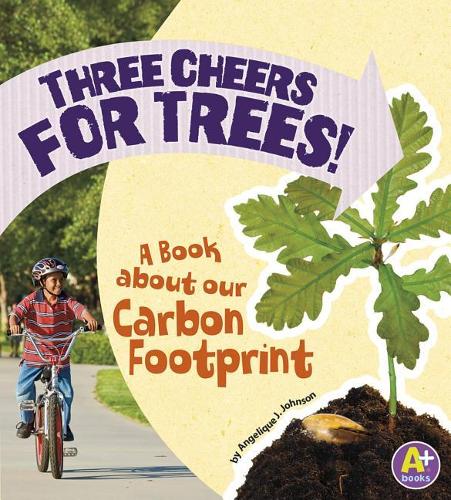
Three Cheers for Trees!: a Book About Our Carbon Footprint (Earth Matters)
(Paperback)
Publishing Details
Three Cheers for Trees!: a Book About Our Carbon Footprint (Earth Matters)
By (Author) Angie Lepetit
Capstone Press
Capstone Press
1st January 2013
United States
Classifications
Children
Non Fiction
Childrens / Teenage social topics: Environment, sustainability and green issues
Childrens / Teenage general interest: Plants and trees
Childrens / Teenage general interest: Nature, animals, the natural world
363.7
Physical Properties
Paperback
32
Description
Lights on or lights off Take your bike or ride the bus The choices you make every day affect the planet. Learn about carbon footprints and ways to be earth-friendly.
Reviews
...opening pages of this book show footprints in the sand on a beach providing the analogy to begin a discussion of what a carbon footprint is for young readers. . . .Beautiful photographs continue the message in this book suggesting ways to conserve and reuse/recycle all kinds of things.-- "Reading Today Online"
STARRED REVIEW! Three Cheers for Trees and What's Sprouting in My Trash, two books from the Earth Matters series, offer simple, clear and accurate explorations of their subjects. Aimed at early primary school children, each book has easy to read text with related color illustrations. Short glossaries and supplemental reading lists at the ends of the books are a plus. An online reference, www.facthound.com, leads to additional material. What's Sprouting in My Trash introduces nature's own recycling, of fallen leaves helping to enrich the soil. Worms and microorganisms in the soil do the work to turn waste into humus. The book describes composting, including what should and should not be used yes to vegetable material, no to meat since it may attract unwanted wild animal attention. It suggests experimenting with composting in a glass jar. I did not try this but it seems an interesting idea. The rest of the material on composting is consistent with my long experience in having compost piles that turn into humus very useful for gardening. . . .The other book, Three Cheers for Trees, discusses our carbon footprint, including why we call it that, and has suggestions for reducing it, celebrating the importance of trees in the carbon cycle. Mentioned are reuse of material goods and recycling of items not reusable and substituting walking or bicycling for mechanized transit.-- "Science Books & Films"
